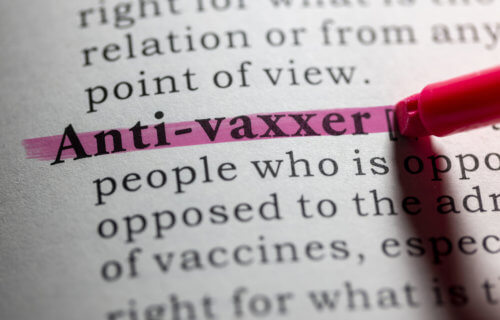
BOSTON, Mass. — Anti-vaxxers who believe more misinformation about the coronavirus vaccine are more likely to suffer from depression, a new study reveals. A team from Massachusetts General Hospital examining over 15,000 people found that people who endorse misleading vaccine-related theories are more prone to mental health problems.
“These findings suggest another potential benefit of public health efforts to address depressive symptoms, namely reducing susceptibility to misinformation,” researchers write in the journal JAMA Network Open.
Participants with moderate to severe depressive symptoms were more than twice as likely to endorse at least one of four false statements presented to them about the COVID vaccine. Moreover, they were also less likely to be vaccinated. Researchers believe the phenomenon could be the result of a loss of trust.
Estimates show that one in four adults in the United States have been affected by depression during the pandemic. Studies show this could also put them at greater risk of contracting COVID-19. Individuals with depression may also exhibit less optimistic beliefs, which could lead them to underestimate the potential benefit of vaccination.
“Notably, mood disorders have been associated with worse COVID-19 outcomes among hospitalized patients,” researchers write in their report.
Misinformation getting worse during COVID
The team analyzed responses from two waves of an online survey for adults across the U.S. between May and July 2021.
“While this study design cannot address causation, the association between depression and spread and impact of misinformation merits further investigation,” study authors explain.
The potential for misinformation to impact public health behavior is a topic that goes back well before the current pandemic. However, the consequences are becoming even more apparent now. Vaccine misinformation can hinder efforts to mitigate the spread of the virus by minimizing a person’s perception of their risk for infection. It can also discourage them from wearing masks, practicing social distancing, and make them less likely to get the COVID vaccine.
“In the context of political misinformation, both anger and anxiety are associated with promoting beliefs in certain types of false stories,” study authors continue.
Anti-vaxxers often focus on the negative
Researchers assessed vaccine-related misinformation using four specific statements.
“We selected these statements based on misinformation prevalent on social media platforms in spring 2021,” the team adds.
These statements included “The COVID-19 vaccines will alter people’s DNA,” “The COVID-19 vaccines contain microchips that could track people,” “The COVID-19 vaccines contain the lung tissue of aborted fetuses,” and “The COVID-19 vaccines can cause infertility, making it more difficult to get pregnant.”
At the conclusion of the experiment, scientists told respondents which items were not true, to ensure that the survey itself did not spread misinformation.
“We found that presence of moderate or greater depressive symptoms was associated with greater likelihood of endorsing misinformation about vaccines,” study author Dr. Roy Perlis reports, “an association that persisted with adjustment for sociodemographic features as well as self-reported ideology and political party affiliation.”
Individuals with major depressive symptoms often exhibit a more pronounced “negativity bias,” where bad thoughts receive greater focus, Perlis explains. Therefore, depression could facilitate the uptake of misinformation at an individual level.
“Alternatively, it is possible that the association between depression and misinformation could be mediated by change in trust,” Dr. Perlis says. “Individuals with depression could exhibit less willingness to trust institutions attempting to combat misinformation, such as the Centers for Disease Control and Prevention, or greater willingness to trust other institutions that distribute misinformation.”
“As anticipated, we also found that individuals who embraced health misinformation were less likely to be vaccinated or be willing to get the vaccine if available,” the researchers conclude. “As such, individuals already burdened with depression may be at a higher risk of COVID-19.”
South West News Service writer Mark Waghorn contributed to this report.
